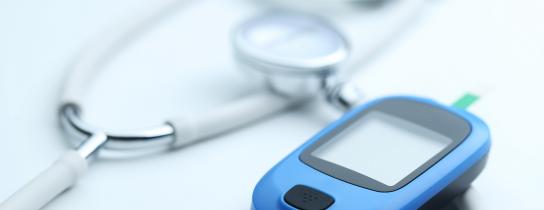
Ask Endocrinologist, Archana Durga Narla, MD: What is Diabetes?
Diabetes is a medical condition that results in elevated glucose (sugar) levels also known as hyperglycemia.
Your body’s cells need glucose to function normally and the hormone insulin helps get the glucose into those cells. If your body is unable to produce insulin or does not use it properly, then hyperglycemia occurs.
Is there more than one type of diabetes?
Yes! The two most common forms of diabetes are Type 1 diabetes and Type 2 diabetes.
- Type 1 Diabetes occurs when the body makes little or no insulin.
- Type 2 Diabetes occurs when the body either does not make enough insulin, does not respond properly to it or a combination of the two.
What are some symptoms suggestive of diabetes?
Most people with Type 2 diabetes do not have any symptoms. However, some people will experience increased urination, increased thirst, increased hunger, blurred vision and unexplained weight loss.
Why is treatment of diabetes so important, especially when it rarely causes symptoms?
Untreated diabetes can lead to multiple medical problems over time, including but not limited to:
- Heart attack
- Stroke
- Vision problems including blindness
- Kidney damage requiring dialysis
- Nerve damage in the hands and feet and need for amputations.
How am I diagnosed with diabetes?
There are a variety of tests that can be used to diagnose diabetes which require blood work. Your doctor will determine which of these four tests are right for you.
- Hemoglobin A1C provides you with an average of your blood glucose level over the past 3 months. You do not have to fast in order to have this test. Diabetes is diagnosed when the glucose value is greater than or equal to 6.5%.
- A fasting blood glucose test diagnoses diabetes when the level is greater than or equal to 126 mg/dL.
- An oral glucose tolerance test (OGTT) requires you to drink a sweet drink and have glucose levels checked before and 2 hours after the drink. Diabetes is diagnosed if the 2 hour glucose level is greater than or equal to 200 mg/dL.
- Checking random glucose levels diagnoses diabetes if the levels are greater than or equal to 200 and you are having classic symptoms of diabetes.
Is diabetes preventable?
Yes! Before someone is diagnosed with diabetes, they will usually have “pre-diabetes”. Pre-diabetes means that a person’s glucose levels are higher than normal but not yet in the diabetic range.
The same lab testing as diabetes can be used to identify pre-diabetes.
- A1C 5.7-6.4%
- Fasting glucose level 100 – 125 mg/dL
- An OGTT glucose of 140 – 199 mg/dL.
It’s important to get diagnosed if you have pre-diabetes as early treatment for people with pre-diabetes can return glucose levels back to a normal range.
Research has shown that even modest weight loss of about 7% of your body weight can significantly lower your risk of progressing to Type 2 Diabetes.
What are my treatment options for Diabetes?
Treatment of diabetes involves multiple methods, including one or a combination of the following:
- Lifestyle changes such as increased physical activity and a nutritious diet
- Oral medications
- Non-insulin injectable medications
- Insulin
Talk to your Primary Care Provider if you have concerns about diabetes or pre-diabetes. Your PCP can evaluate the situation, recommend testing, and refer you to an endocrinologist if needed.
Archana Durga Narla, MD, is an Endocrinologist at Crystal Run Healthcare in West Nyack. She earned her Medical Degree from the Medical University of South Carolina in Charleston, SC. Dr. Narla completed her Residency in Internal Medicine and Fellowship training in Endocrinology, Diabetes and Metabolism at the University of Kentucky in Lexington, KY. She is Board Certified in Internal Medicine specializing in Endocrinology and treats everything from diabetes and thyroid disorders to osteoporosis.

 Optum Radiology at Crystal Run Healthcare
Optum Radiology at Crystal Run Healthcare Request medical records online
Request medical records online